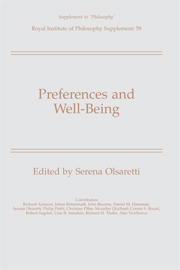Book contents
- Frontmatter
- Contents
- List of Contributors
- “Introduction”
- “Desire Formation and Human Good”
- “Preference Formation and Personal Good”
- “Leading a Life of One's Own: On Well-Being and Narrative Autonomy”
- “Well-Being, Adaptation and Human Limitations”
- “Consequentialism and Preference Formation in Economics and Game Theory”
- “Preferences, Deliberation and Satisfaction”
- “Content-Related and Attitude-Related Reasons for Preferences”
- “Reasoning with Preferences?”
- “Taking Unconsidered Preferences Seriously”
- “Preferences, Paternalism, and Liberty”
- “Preference Change and Interpersonal Comparisons of Welfare”
“Desire Formation and Human Good”
Published online by Cambridge University Press: 07 May 2010
- Frontmatter
- Contents
- List of Contributors
- “Introduction”
- “Desire Formation and Human Good”
- “Preference Formation and Personal Good”
- “Leading a Life of One's Own: On Well-Being and Narrative Autonomy”
- “Well-Being, Adaptation and Human Limitations”
- “Consequentialism and Preference Formation in Economics and Game Theory”
- “Preferences, Deliberation and Satisfaction”
- “Content-Related and Attitude-Related Reasons for Preferences”
- “Reasoning with Preferences?”
- “Taking Unconsidered Preferences Seriously”
- “Preferences, Paternalism, and Liberty”
- “Preference Change and Interpersonal Comparisons of Welfare”
Summary
In Wuthering Heights a man and a woman fall in love and their passion for each other wreaks havoc on several lives, theirs included. Long after his beloved is dead, Heathcliff's life revolves entirely around his love for her. Frustrated by events, his grand romantic passion expresses itself in destructive spasms of antisocial behavior. Catherine, the object of this passion, marries another man on a whim, but describes her feelings for him as like superficial foliage, whereas ‘her love for Heathcliff resembles eternal rocks beneath.’ ‘I am Heathcliff,’ she declares, shortly before dying at the age of nineteen.
As a reader of the novel, I confess to an impulse to preach little sermons on bourgeois prudence to the main characters. In my family, adolescents caught in romantic turmoil are told, ‘Men are like buses—If you miss one, another will come along in ten minutes.’ Buses are heterogeneous, and differ from one another in ways that make them differentially charming, but in important ways they are fungible. It can make sense to become passionately attached to a person or a bus, but not so attached that one is in thrall to that particular attachment and cannot withstand its demise. The love of Heathcliff and Catherine looks to be an instance of the vice that Robert Adams calls idolatry, caring for a finite good to an extent that would be appropriate only for an infinite good.
- Type
- Chapter
- Information
- Preferences and Well-Being , pp. 9 - 32Publisher: Cambridge University PressPrint publication year: 2006
- 3
- Cited by



